23 Best Foods For A Healthy Liver & Signs Of An Unhealthy Liver
Improve liver health by adding natural ingredients like grapefruit and ginseng to your diet.
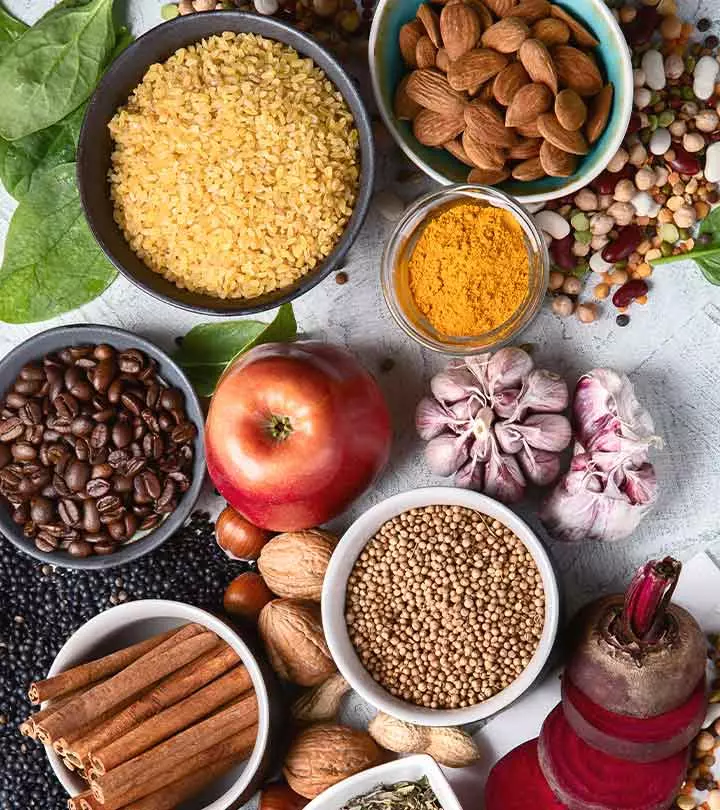
Image: Shutterstock
The liver is the second largest organ in the body (1). And you need to consume certain foods for a healthy liver. The organ detoxifies and helps in protein synthesis, metabolism, and the production of chemicals required for the digestive process. It also stores glycogen and plays a role in bile production, hormone secretion, and decomposition of red blood cells (2). Therefore, any liver disorder may hamper all these metabolic functions. So how can we protect the liver? What is the best food for liver health? Do not worry! We can help you with these doubts. Continue reading to learn about the 23 foods that promote liver health.

In This Article
23 Best Foods For A Healthy Liver
1. Garlic
Detoxification is important to keep your liver healthy. Garlic is rich in allicin, an antioxidant that protects the body from oxidative damage (3). It also exhibits hepatoprotective (liver protection) effects, which stimulate the liver to activate the enzymes that can flush out harmful substances (4).
A study published in Advanced Biomedical Research stated that 400 mg garlic powder could reduce body weight and fat mass among subjects with Nonalcoholic Fatty Liver Disorder (NAFLD) without disturbing lean body mass (5). Following a fatty liver diet is very effective in the long run.
Garlic Dosage For A Healthy Liver
- 1 clove of raw garlic in the morning every day.
- 1-2 teaspoons of minced/chopped/pasted garlic in cooked food per day.
2. Green Tea
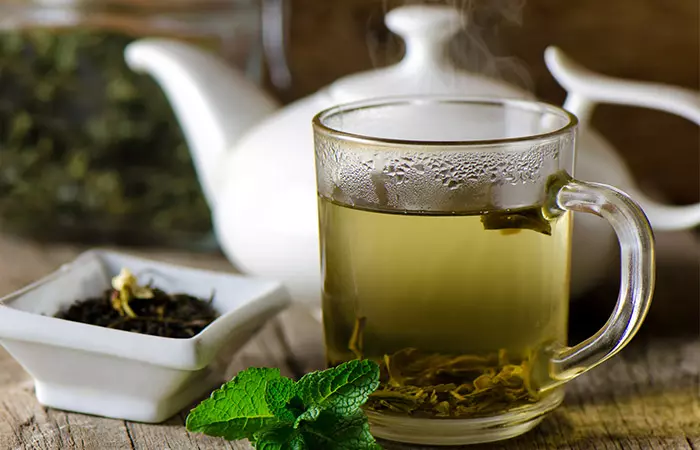
Green tea is rich in antioxidants and has many health benefits. The main polyphenolsi A family of naturally occurring organic compounds found in many plant-based foods with disease-preventing properties. responsible for all the goodness of green tea are the catechinsi A substance found in tea with antioxidant properties that helps protect cells from damage due to free radicals (unstable atoms). . Chinese scientists confirmed that green tea drinkers showed a significant reduction in the risk of liver cancer, liver disease, liver steatosisi Also known as fatty liver, it is a common condition caused by an increased build-up of excess fat in the liver. , liver cirrhosis, and hepatitis (6).
Researchers from Isfahan University of Medical Sciences, Iran, conducted a double-blind, placebo-controlled, randomized clinical trial on nonalcoholic fatty liver patients. They received either green tea extract or green tea extract supplement for 12 weeks. After the 12th week, it was found that green tea extract significantly reduced the liver enzymes associated with nonalcoholic fatty liver disease (7).
However, some studies have shown the harmful effects of overconsumption of tea, which may be due to three main factors: (i) its caffeine content, (ii) the presence of aluminum, and (iii) the effects on iron bioavailability.
Hence, green tea may not be healthful for all individuals. Talk to your doctor before consuming green tea for improving your liver health (8).
Green Tea Dosage For Healthy Liver
2-3 cups of green tea per day.
3. Coffee
Coffee is one of the most loved beverages. In addition to its stimulating effects, coffee also has a hepatoprotective role (9). A study on middle-aged Japanese men showed that coffee might offer protective effects against liver dysfunction (10).
Another study published in the Journal of Hepatology showed an inverse relationship between coffee intake and the incidence of chronic liver disease. Participants who drink 3 cups of coffee per day showed lower rates of disease progression than those who drank less than 1 cup/day (11).
Coffee Dosage For A Healthy Liver
2-3 cups of coffee per day.
 Quick Tip
Quick Tip4. Turmeric
Curcumin in turmeric is the main bioactive agent that has a hepatoprotective effect.
It helps to protect the liver from liver diseases and injury by reducing inflammation, minimizing oxidative stress, and improving lipid metabolism and insulin sensitivity (12), (13).
Scientists from the Tel-Aviv Sourasky Medical Center, Israel, conducted an experiment on rats with induced cirrhosis of the liver. They were supplemented with turmeric for 12 weeks. Turmeric’s anti-inflammatory property inhibited the development of liver cirrhosis in rats (14).
Turmeric Dosage For A Healthy Liver
- 1-3 g of turmeric powder/paste per day.
- 5-3 g of turmeric root per day.
- 400-600 mg of turmeric supplement, 2-3 per day.
- Tincture (1:2) – 15-30 drops, 3-4 times per day.
- Fluid extract (1:1) – 30-90 drops per day.
You can mix it with bulletproof coffee or milk and consume it for better results.
Kinley Slayed, a blogger, shares her personal experience with liver pain. Highlighting the reluctance of alcoholics to seek medical help, she stresses the importance of dietary changes for liver health. All of this led her to exploring the benefits of turmeric and other spices, and she encourages incorporating them into daily cooking for liver healing. She adds, “Don’t like the flavor of turmeric? Blend it into smoothies, sneak it into salad dressings, soups and stews. I sprinkle in just about everything now. I like it in my eggs every morning…. You can also find this powerhouse in supplement form (i).”
5. Grapefruit
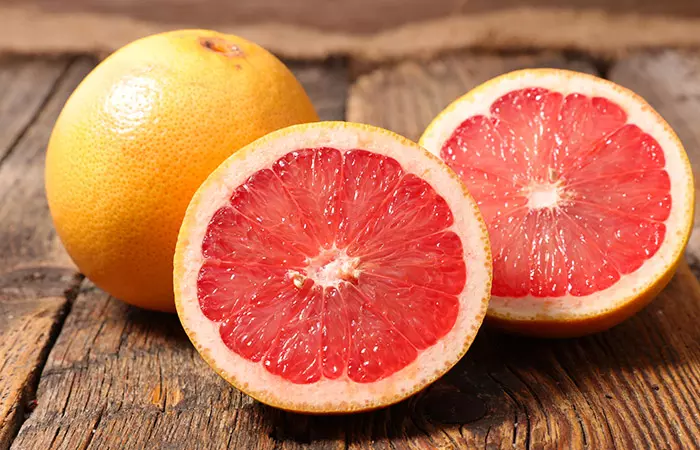
Grapefruit is a rich source of antioxidants and has been found to boost immunity. Japanese scientists carried out an experiment in which they fed lab rats with grapefruit juice, oroblanco juice, and sugar mix. After one week, the rats were injected with a procarcinogen. The rats that were fed grapefruit juice were found to have a quicker and more active expression of liver enzymes that helped in detoxification (15).
Grapefruit Dosage For A Healthy Liver
½ -1 grapefruit juice (freshly pressed and no added sugar or artificial sweetener) per day.
6. Beetroot
Beetroot contains antioxidants called betalains that exhibit potent antioxidant and anti-inflammatory effects to reduce oxidative stress (16). A rat study showed that long-term feeding of beetroot juice could help reduce DNA damage and liver injury induced by oxidative stress (17).
Beetroot Dosage For A Healthy Liver
- 1 glass of beetroot juice per day.
- 1 cup of beetroot, 2-3 times a week.
7. Broccoli
Broccoli is an excellent source of isothiocyanates, sulfur-containing compounds, the most notable of which is sulforaphane. The isothiocyanates regulate the expression of genes that are involved in flushing out carcinogensi Substances or agents that promote carcinogenesis (cancer formation) in humans and animals. and improving metabolism. They also have anti-inflammatory properties (18).
A study conducted by scientists at the University of Illinois confirmed that consuming broccoli could help reduce the risk of developing nonalcoholic fatty liver (19). Another study conducted by the College of Agriculture, University of Illinois, stated that consuming broccoli could help protect the liver from liver cancer (20).
Broccoli Dosage For A Healthy Liver
1 cup, 2-3 times per week.
8. Ginseng
Ginseng is a medicinal herb found in the roots of the plant Panax ginseng (not to be confused with American or Siberian ginseng). It contains compounds known as ginsenosides that are thought to be responsible for its medicinal properties. There are about 40 ginsenosides present in ginseng. It has been found to protect against liver injury, liver toxicity, cirrhosis, and fatty liver (21).
Ginseng Dosage For A Healthy Liver
2 cups of ginseng tea per day.
9. Carrot
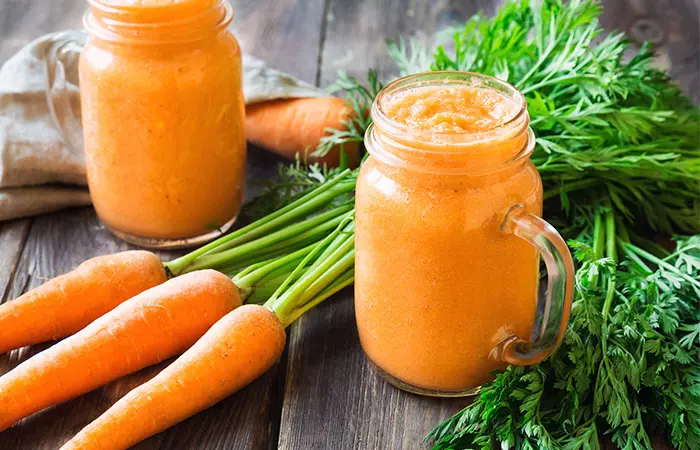
Carrots can reduce the risk of nonalcoholic fatty liver and liver toxicity. Scientists from the National Institute of Nutrition, Jamia Osmania, Hyderabad, India, conducted a study by supplementing rats with carrot juice for eight weeks. They found that carrot juice significantly reduced the DHA, triglyceride, and MUFA (Mono Unsaturated Fatty Acids) levels in the liver (22).
Carrot Dosage For A Healthy Liver
- 1 glass of carrot juice every 2 days.
- 1 cup of cooked carrot every 2-3 days.
10. Leafy Greens
Leafy green veggies can protect your liver from oxidative damage and other diseases. Veggies, such as collard greens, spinach, lettuce, radish greens, mustard greens, sweet potato greens, rocket spinach, etc., contain good amounts of vitamins A, C, and K, calcium, and antioxidants and have anti-inflammatory properties (23).
Consuming leafy greens could help protect the liver from developing fatty liver in rat studies (24).
Leafy Greens Dosage For A Healthy Liver
1-2 cups of green leafy veggies per day.
11. Avocado
This buttery and nutty fruit has many health benefits, and protecting the liver is one of them. Avocados are rich in healthy fats that have anti-inflammatory and antioxidant properties.
Since the nonalcoholic fatty liver is caused due to bad lifestyle choices, the anti-inflammatory and antioxidant properties of avocado can help in reducing the risk (25). Japanese scientists found that supplementing lab subjects with avocado could suppress liver damage (26).
Avocado Dosage For A Healthy Liver
2-5 slices, 2-3 times per week.
12. Lemon
The hepatoprotective effects of lemon juice are due to its vitamin (especially vitamin C) and mineral content. A mice study published in Biomedical Research states that intake of lemon juice can help reduce alcohol-induced liver injury and decrease the levels of liver enzymes for overall liver protection (27).
Lemon Dosage For A Healthy Liver
½-1 lemon per day.
13. Apple
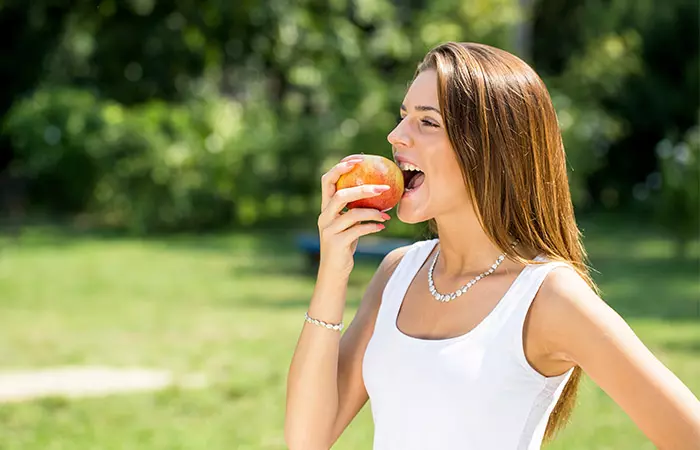
Scientists studied the effect of dehydrated apple products on liver and serum lipid levels. After three months, it was found that apple products successfully reduced the serum and liver lipid levels (28).
Chinese researchers also confirmed that apple polyphenols play a major role in protecting against concanavalin (a lectin from the legume family) induced immunological liver injury in mice (29).
Apple Dosage For A Healthy Liver
1 apple per day.
14. Olive Oil
The most common liver problem is a nonalcoholic fatty liver disease that stems from unhealthy lifestyle choices. Scientists have found that people who consume olive oil are less prone to liver diseases.
Olive oil helps to lower bad cholesterol and serum triglyceride levels and increase insulin sensitivity and lipid oxidation (30). Hence, you can use olive oil in food preparations to keep your liver healthy.
Olive Oil Dosage For Healthy Liver
3-5 tablespoons per day or more than 10 g/day (31).
15. Asparagus
Asparagus is an excellent source of vitamins A, C, E, K, folate, choline, and minerals like calcium, magnesium, phosphorus, potassium, and dietary fiber (32).
Scientists from Jeju National University, Korea, conducted an experiment and found that the young shoots and leaves of asparagus could help suppress the hepatoma cell growth (cancerous liver cells) and reduce oxidative stress to protect liver cells (33).
Asparagus Dosage For A Healthy Liver
Talk to your doctor to determine how much asparagus you can consume per week.
16. Walnut
Walnuts are rich in healthy fats that have anti-inflammatory properties. In a study, high-fat diet-induced fatty liver mice were supplemented with walnuts. This nut helped reduce triglyceride levels in the liver, lowered the levels of enzymes involved in liver homeostasis, and suppressed the genes involved in liver inflammation (34).
Walnut Dosage For A Healthy Liver
7 walnuts per day
17. Red Cabbage
Red cabbage in salads can help protect your liver. A study on rats showed that red cabbage extract reduced liver injury due to oxidative stress (35).
Red Cabbage Dosage For A Healthy Liver
1 cup of cabbage once a day, 2-3 times per week.
18. Whole Grains
Whole grains, such as amaranth, rye, barley, brown rice, quinoa, etc., are rich in dietary fiber, which helps to shed fat and reduce cholesterol. This is good news because whole grains can also help protect against nonalcoholic fatty liver disease (36), (37).
Whole Grains Dosage For A Healthy Liver
2-3 servings of whole grain per day.
19. Tomatoes
The juicy red tomatoes are also good for your liver. They contain a good amount of antioxidants that help reduce liver inflammation and injury and protect against liver cancer. A study on rats showed that tomato extract supplementation could help reduce the risk of liver damage (38).
Tomato Dosage For A Healthy Liver
- 1 glass of tomato juice per day.
- 2-3 tomatoes per day.
20. Dandelion
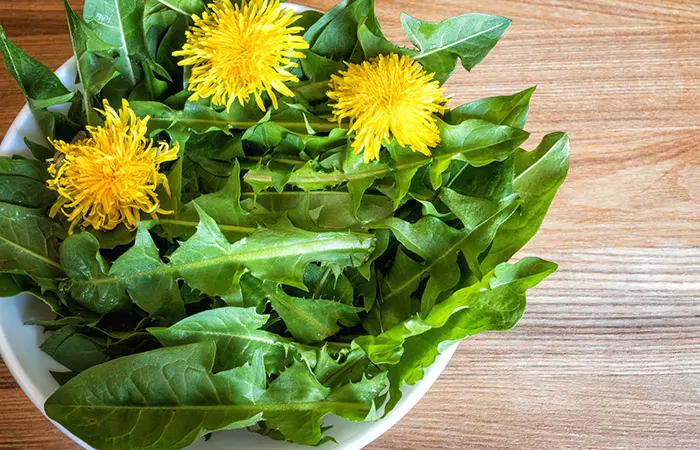
A study published in the Journal of Food and Chemical Toxicology showed that dandelion roots were protective against alcohol-induced liver damage due to their antioxidative property (39).
Dandelion Dosage For A Healthy Liver
Talk to your doctor to determine the dose of this herbal medicine or eat the greens a couple of times per week.
21. Brussel Sprouts
Brussels sprouts are rich in vitamins A, K, C, and folate and minerals like calcium, phosphorus, magnesium, and potassium (40). Researchers have found that the oral administration of Brussels sprouts can induce the production of phase II metabolizing enzymes and reduce oxidative stress (41).
Brussels Sprouts Dosage For A Healthy Liver
½-1 cup, 2-3 times per week.
22. Berries
Berries, such as blueberries and cranberries, are potent sources of antioxidants like anthocyanins and flavonoids that are crucial for liver health. They combat oxidative stress, reduce liver inflammation, and aid detoxification. These properties support the liver’s natural filtering and cleansing functions, ensuring optimal liver health. (42)
Berries Dosage For A Healthy Liver
Approximately 1/2 to 1 cup of fresh or frozen blueberries and cranberries daily.
23. Grapes
Grapes, especially the red and purple varieties, contain antioxidants like resveratrol that combat oxidative stress, safeguarding the liver from damage. They have natural compounds that aid the liver’s detoxification process, eliminating toxins and promoting overall liver function. Grapes contain anti-inflammatory agents that reduce liver inflammation and support its optimal performance (43).
Grapes Dosage For a Healthy Liver
1 to 1&½ cup of grapes daily
 Quick Tip
Quick TipOther than these foods, fish (a lean protein), legumes (beans, chickpeas, and lentils), sunflower seeds, and low-fat milk also are healthy for the liver.
Along with incorporating the best foods for liver health, adopting specific lifestyle habits can further enhance your liver’s overall function. Scroll down to learn more about them.
Key Takeaways
- Include vegetables like broccoli, beetroot, and carrots to fight liver toxicity and improve metabolism.
- Eat foods rich in dietary fiber like asparagus and whole grains to protect against non-alcoholic fatty liver disease.
- Green tea, olive oil, walnuts, and coffee may improve overall liver health.
- Dark urine, poor appetite, yellow skin or eyes, and chronic fatigue are a few signs of a liver not functioning properly.
Lifestyle Tips For Liver Health
Here are a few changes you may incorporate into your daily routine to maintain a healthy liver:
- Regular aerobic exercise, such as riding a bike or jogging, improves blood circulation and aids the liver’s ability to filter toxins (44).
- Chronic stress can impair liver function (45). Therefore, reducing stress through yoga or meditation may be beneficial.
- Maintaining adequate hydration is also important, as it helps detoxify the liver and prevent liver-related issues (46).
- Reducing alcohol consumption, maintaining a healthy weight, and avoiding dangerous chemicals all help the liver. Lastly, getting adequate sleep each night helps the liver repair itself and perform at its best.
Classic And Lesser-Known Signs That Your Liver Is Not Functioning Properly
If you identify with any of the symptoms listed below, talk to the doctor to check for other underlying problems:
- Inability to lose weight
- Bloating
- Dark urine
- Poor appetite
- Compromised immunity
- Constipation
- Headache
- Heartburn and acid reflux
- Depression
- Anxiety
- Chronic fatigue
- Excessive sweating
- Hypertension
- Rosacea
- Bruising
- Yellow skin and eyes
Infographic: Risk Factors For Liver Disease
The liver is one of the major organs in the human body that plays a vital role. However, today’s fast-paced lifestyle negatively affects the liver in many ways. At times, the damage may even be irreversible. Hence, understanding the triggers of liver disease helps one take preventive action and reduce the risk.
The following infographic provides information about the various factors that can increase the risk of liver disease. Take a look.
Some thing wrong with infographic shortcode. please verify shortcode syntax
Certain foods exhibit a hepatoprotective effect. These promote the proper functioning of the liver. Some of the foods for healthy liver include garlic, green tea, coffee, turmeric, grapefruit, broccoli, beetroot, leafy greens, tomatoes, dandelions, olive oil, asparagus, walnuts, and whole grains. Including these foods regularly in your diet helps boost liver function and minimizes any damage to the organ. However, consult your doctor before adding any new foods to your diet.
Frequently Asked Questions
Is papaya good for the liver?
Sheri Gaw, a Registered Dietitian Nutritionist, says, “Papaya is loaded with antioxidants that have been shown to reduce the risk of cancer and support liver health. Also, from studies, its extract is promising for the treatment of liver cancer among several other types of cancer.”
Is Honey good for the liver?
Gaw says, “Honey is different from other types of added sugars as it is packed with antioxidants and anti-inflammatory properties. It can suppress inflammatory markers that are associated with liver injury.”
How does diet affect liver function?
The nutrients that the diet provides for liver regeneration, cleansing, and general health play a critical role in liver function. When processed foods, sugar, and unhealthy fats are consumed in excess, the liver may get damaged and develop diseases like fatty liver disease. However, a balanced diet high in fruits, vegetables, whole grains, and lean proteins improves liver function.
What foods are hard on the liver?
Fast foods, canned foods, sugary foods, red meat, alcohol, and soda can increase the load on the liver and affect its functioning. Therefore, avoid them.
Is drinking water good for your liver?
Drinking water can help flush out toxins from the body. Drink more water to keep your liver healthy.
Is coconut water good for the liver?
Coconut water is a good electrolyte to rehydrate your body. You need to drink more electrolytesi Minerals that carry an electric charge that balances the amount of fluid in the body and can affect body functions. to nourish your body and liver.
Are bananas good for your liver?
Yes. Yes, bananas are healthy for the liver and may help relieve cirrhosis (chronic liver damage) (47). However, try to limit them to 1-2 per day, as the fructose in them might cause fatty liver problems.
How do I know if my liver is detoxing?
Liver detoxification is a crucial step in recovery and is characterized by symptoms such as nausea, vomiting, headaches, anxiety, elevated heart rate, excessive sweating, etc. You can go on a detox diet once a week or as recommended by your doctor or dietician.
How do you resolve a fatty liver?
The most effective remedy for fatty liver disease is lifestyle changes and a healthy diet. Consult a doctor to understand the diet and lifestyle recommendations for your condition and stick to them. You can also try some yoga asanas for a healthy liver.
Are eggs good for the liver?
Consuming eggs in limited amounts is good for the liver and overall health. However, excessive egg consumption (2-3 per week) may increase the risk of developing non-alcoholic fatty liver diseases (48).
The liver plays an important role in cleansing our body, and certain foods may help in its proper function. Watch this video to find out about the top 10 foods that are friendly to the liver
Personal Experience: Source
StyleCraze's articles are interwoven with authentic personal narratives that provide depth and resonance to our content. Below are the sources of the personal accounts referenced in this article.
i. Spice Up Your Life and Your Liver with These Four Body Cleansing Spiceshttps://kinslayed.medium.com/spice-up-your-life-and-your-liver-with-these-four-body-cleansing-spices-e52864f7c751
References
Articles on StyleCraze are backed by verified information from peer-reviewed and academic research papers, reputed organizations, research institutions, and medical associations to ensure accuracy and relevance. Read our editorial policy to learn more.
- Liver Anatomy, The Surgical Clinics of North America, US National Library of Medicine, National Institutes of Health.
https://www.ncbi.nlm.nih.gov/pmc/articles/PMC4038911/ - How does liver work? US National Library of Medicine, National Institutes of Health.
https://www.ncbi.nlm.nih.gov/books/NBK279393/ - The antioxidant properties of garlic compounds: allyl cysteine, alliin, allicin, and allyl disulfide, Journal of Medicinal Foods, US National Library of Medicine, National Institutes of Health.
https://pubmed.ncbi.nlm.nih.gov/16822206/ - Garlic: a review of potential therapeutic effects, Avicenna Journal of Phytomedicine, US National Library of Medicine, National Institutes of Health.
https://www.ncbi.nlm.nih.gov/pmc/articles/PMC4103721/ - Effect of garlic powder consumption on body composition in patients with nonalcoholic fatty liver disease: A randomized, double-blind, placebo-controlled trial, Advanced Biomedical Research, US National Library of Medicine, National Institutes of Health.
https://www.ncbi.nlm.nih.gov/pmc/articles/PMC4763563/ - The effect of green tea intake on risk of liver disease: a meta analysis, International Journal of Clinical and Experimental Medicine, US National Library of Medicine, National Institutes of Health.
https://www.ncbi.nlm.nih.gov/pmc/articles/PMC4538013/ - The Effect of Green Tea Extract Supplementation on Liver Enzymes in Patients with Non alcoholic Fatty Liver Disease, International Journal of Preventive Medicine, US National Library of Medicine, National Institutes of Health.
https://www.ncbi.nlm.nih.gov/pmc/articles/PMC4763469/ - Beneficial effects of green tea: A literature review, Chinese Medicine, US National Library of Medicine, National Institutes of Health.
https://www.ncbi.nlm.nih.gov/pmc/articles/PMC2855614// - Coffee and tea consumption are associated with a lower incidence of chronic liver disease in the United States, Gastroenterology, US National Library of Medicine, National Institutes of Health.
https://pubmed.ncbi.nlm.nih.gov/16344061/ - Effects of coffee consumption against the development of liver dysfunction: a 4-year follow-up study of middle-aged Japanese male office workers, Industrial Health, US National Library of Medicine, National Institutes of Health.
https://pubmed.ncbi.nlm.nih.gov/10680318/ - Coffee intake is associated with lower rates of liver disease progression in chronic hepatitis C, Hepatology, US National Library of Medicine, National Institutes of Health.
https://pubmed.ncbi.nlm.nih.gov/19676128/ - Pharmacological actions of curcumin in liver diseases or damage, Liver International, US National Library of Medicine, National Institutes of Health.
https://pubmed.ncbi.nlm.nih.gov/19811613/ - Recent advances in curcumin and its derivatives for treatment of liver diseases, Acta pharmaceutica Sinica, US National Library of Medicine, National Institutes of Health.
https://pubmed.ncbi.nlm.nih.gov/25757271/ - Prevention of liver cirrhosis in rats by curcumin, Liver International, US National Library of Medicine, National Institutes of Health.
https://pubmed.ncbi.nlm.nih.gov/17355460/ - Grapefruit and oroblanco enhance hepatic detoxification enzymes in rats: possible role in protection against chemical carcinogenesis, Journal of Agricultural and Food Chemistry, US National Library of Medicine, National Institutes of Health.
https://pubmed.ncbi.nlm.nih.gov/15740081/ - The potential benefits of red beetroot supplementation in health and disease, Nutrients, US National Library of Medicine, National Institutes of Health.
https://pubmed.ncbi.nlm.nih.gov/25875121/ - Beetroot juice protects against N-nitrosodiethylamine-induced liver injury in rats, Food and Chemical Toxicology, US National Library of Medicine, National Institutes of Health.
https://pubmed.ncbi.nlm.nih.gov/22465004/ - Isothiocyanates, Linus Pauling Institute, Oregon State University.
https://lpi.oregonstate.edu/mic/dietary factors/phytochemicals/isothiocyanates - Dietary Broccoli Lessens Development of Fatty Liver and Liver Cancer in Mice Given Diethylnitrosamine and Fed a Western or Control Diet, The Journal of Nutrition, US National Library of Medicine, National Institutes of Health.
https://pubmed.ncbi.nlm.nih.gov/26865652/ - Dietary Broccoli Lessens Development of Fatty Liver and Liver Cancer in Mice Given Diethylnitrosamine and Fed a Western or Control Diet.
https://www.ncbi.nlm.nih.gov/pmc/articles/PMC4763488/ - Pharmacological Effects of Ginseng on Liver Functions and Diseases: A Minireview, Evidence-based Complementary and Alternative Medicine, US National Library of Medicine, National Institutes of Health.
https://www.ncbi.nlm.nih.gov/pmc/articles/PMC3446728/ - Carrot Juice Administration Decreases Liver Stearoyl-CoA Desaturase 1 and Improves Docosahexaenoic Acid Levels, but Not Steatosis in High Fructose Diet-Fed Weanling Wistar Rats, Preventive Nutrition and Food Science, US National Library of Medicine, National Institutes of Health.
https://www.ncbi.nlm.nih.gov/pmc/articles/PMC5063201/ - Dark Green Leafy Vegetables, Agriculture Research Service, U.S. Department of Agriculture.
https://www.ncbi.nlm.nih.gov/pmc/articles/PMC7144047/ - Diets containing traditional and novel green leafy vegetables improve liver fatty acid profiles of spontaneously hypertensive rats, Lipids in Health and Disease, US National Library of Medicine, National Institutes of Health.
https://pubmed.ncbi.nlm.nih.gov/24192144/ - Avocado as a Major Dietary Source of Antioxidants and Its Preventive Role in Neurodegenerative Diseases, Advances in Neurobiology, US National Library of Medicine, National Institutes of Health.
https://pubmed.ncbi.nlm.nih.gov/27651262/ - Liver injury suppressing compounds from avocado (Persea americana), Journal of Agriculture and Food Chemistry, US National Library of Medicine, National Institutes of Health.
https://pubmed.ncbi.nlm.nih.gov/11368579/ - Protective Effects of Lemon Juice on Alcohol-Induced Liver Injury in Mice, BioMed Research International, US National Library of Medicine, National Institutes of Health.
https://www.ncbi.nlm.nih.gov/pmc/articles/PMC5439254/ - Effect of dehydrated apple products on the serum and liver lipids in Syrian hamsters, Nahrung, US National Library of Medicine, National Institutes of Health.
https://pubmed.ncbi.nlm.nih.gov/2267005/ - Hepatoprotective effect of apple polyphenols against concanavalin A-induced immunological liver injury in mice, Chemico-biological Interactions, US National Library of Medicine, National Institutes of Health.
https://pubmed.ncbi.nlm.nih.gov/27567545/ - Olive oil consumption and non-alcoholic fatty liver disease, World Journal of Gastroenterology, US National Library of Medicine, National Institutes of Health.
https://www.ncbi.nlm.nih.gov/pmc/articles/PMC2670406/ - Olive oil intake and risk of cardiovascular disease and mortality in the PREDIMED Study, BMC Medicine, US National Library of Medicine, National Institutes of Health.
https://www.ncbi.nlm.nih.gov/pmc/articles/PMC4030221/ - Nutritive Value of Asparagus, raw, U.S. Department of Agriculture.
https://fdc.nal.usda.gov/fdc-app.html#/food-details/168389/nutrients - Effects of Asparagus officinalis extracts on liver cell toxicity and ethanol metabolism, Journal of Food Science, US National Library of Medicine, National Institutes of Health.
https://pubmed.ncbi.nlm.nih.gov/19895471/ - Dietary walnut reduces hepatic triglyceride content in high-fat-fed mice via modulation of hepatic fatty acid metabolism and adipose tissue inflammation, The Journal of Nutritional Biochemistry, US National Library of Medicine, National Institutes of Health.
https://pubmed.ncbi.nlm.nih.gov/27012628/ - Anthocyanin-rich red cabbage (Brassica oleracea L.) extract attenuates cardiac and hepatic oxidative stress in rats fed an atherogenic diet, Journal of the Science of Food and Agriculture, US National Library of Medicine, National Institutes of Health.
https://pubmed.ncbi.nlm.nih.gov/22228433/ - Increasing whole grain intake as part of prevention and treatment of nonalcoholic fatty liver disease, International Journal of Endocrinology, US National Library of Medicine, National Institutes of Health.
https://pubmed.ncbi.nlm.nih.gov/23762052/ - Dietary habits and behaviors associated with nonalcoholic fatty liver disease, World Journal of Gastroenterology, US National Library of Medicine, National Institutes of Health.
https://www.ncbi.nlm.nih.gov/pmc/articles/PMC3930974/ - Effect of tomato extract supplementation against high-fat diet-induced hepatic lesions, Hepatobiliary surgery and nutrition, US National Library of Medicine, National Institutes of Health.
https://www.ncbi.nlm.nih.gov/pmc/articles/PMC3834971/ - In vitro and in vivo hepatoprotective effects of the aqueous extract from Taraxacum officinale (dandelion) root against alcohol-induced oxidative stress, Food and Chemical Toxicology, US National Library of Medicine, National Institutes of Health.
https://pubmed.ncbi.nlm.nih.gov/20347918/ - Nutritive Value of Brussel sprouts, raw, U.S. Department of Agriculture.
https://fdc.nal.usda.gov/fdc-app.html#/food-details/170383/nutrients - Effects of a Brussels sprouts extract on oxidative DNA damage and metabolising enzymes in rat liver, Food and Chemical Toxicology, Elsevier, Science Direct.
https://www.sciencedirect.com/science/article/pii/S0278691500001708?via%3Dihub - Lyophilized Maqui (Aristotelia chilensis) Berry Administration Suppresses High-Fat Diet-Induced Liver Lipogenesis through the Induction of the Nuclear Corepressor SMILE
https://www.ncbi.nlm.nih.gov/pmc/articles/PMC8143281/ - Effect of dietary supplementation of grape skin and seeds on liver fibrosis induced by dimethylnitrosamine in rats
https://www.ncbi.nlm.nih.gov/pmc/articles/PMC2981719/ - Effect of Exercise on Liver Function and Insulin Resistance Markers in Patients with Non-Alcoholic Fatty Liver Disease: A Systematic Review and Meta-Analysis of Randomized Controlled Trials
https://pmc.ncbi.nlm.nih.gov/articles/PMC10143548/ - Psychosocial stress and liver disease status
https://pmc.ncbi.nlm.nih.gov/articles/PMC2702105/ - Higher plain water intake is related to lower newly diagnosed nonalcoholic fatty liver disease risk: a population-based study
https://pubmed.ncbi.nlm.nih.gov/33837275/ - Plants Consumption and Liver Health
https://www.ncbi.nlm.nih.gov/pmc/articles/PMC4499388/ - Egg consumption and risk of non-alcoholic fatty liver disease
https://www.ncbi.nlm.nih.gov/pmc/articles/PMC5387362/
Read full bio of Dr. Millie Lytle
- Sheri Gaw, RDN, CDCES, is a registered dietitian nutritionist and certified diabetes care & education specialist with over two decades of experience in the field. She has worked in a variety of settings - hospitals, wellness centers, outpatient clinics, retail, and corporate wellness. Sheri graduated from Loyola University Chicago and works full-time in a cardiac and pulmonary wellness center.
 Sheri Gaw, RDN, CDCES, is a registered dietitian nutritionist and certified diabetes care & education specialist with over two decades of experience in the field. She has worked in a variety of settings - hospitals, wellness centers, outpatient clinics, retail, and corporate wellness. Sheri graduated from Loyola University Chicago and works full-time in a cardiac and pulmonary wellness center.
Sheri Gaw, RDN, CDCES, is a registered dietitian nutritionist and certified diabetes care & education specialist with over two decades of experience in the field. She has worked in a variety of settings - hospitals, wellness centers, outpatient clinics, retail, and corporate wellness. Sheri graduated from Loyola University Chicago and works full-time in a cardiac and pulmonary wellness center.
Read full bio of Ravi Teja Tadimalla
Read full bio of Sindhu Koganti







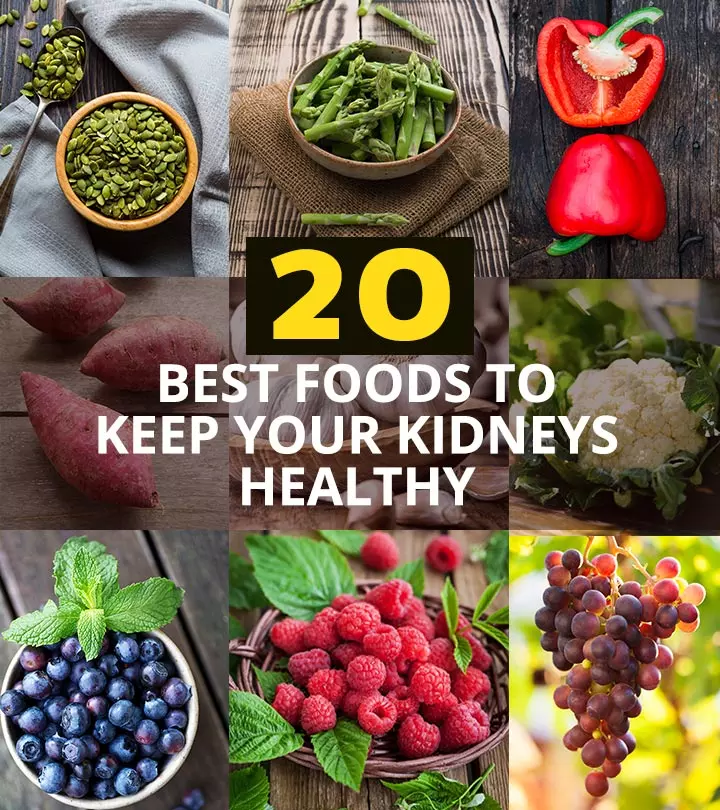

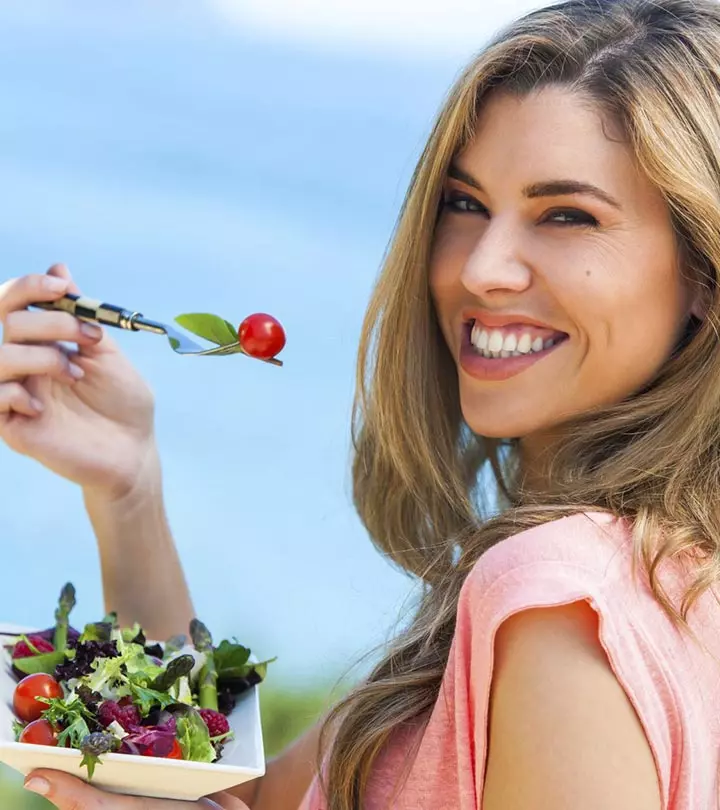
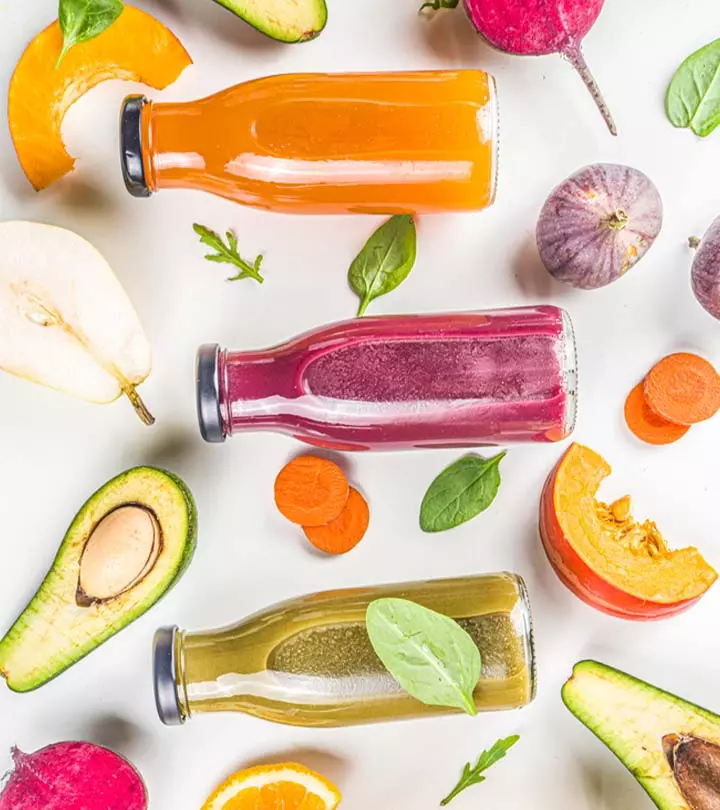
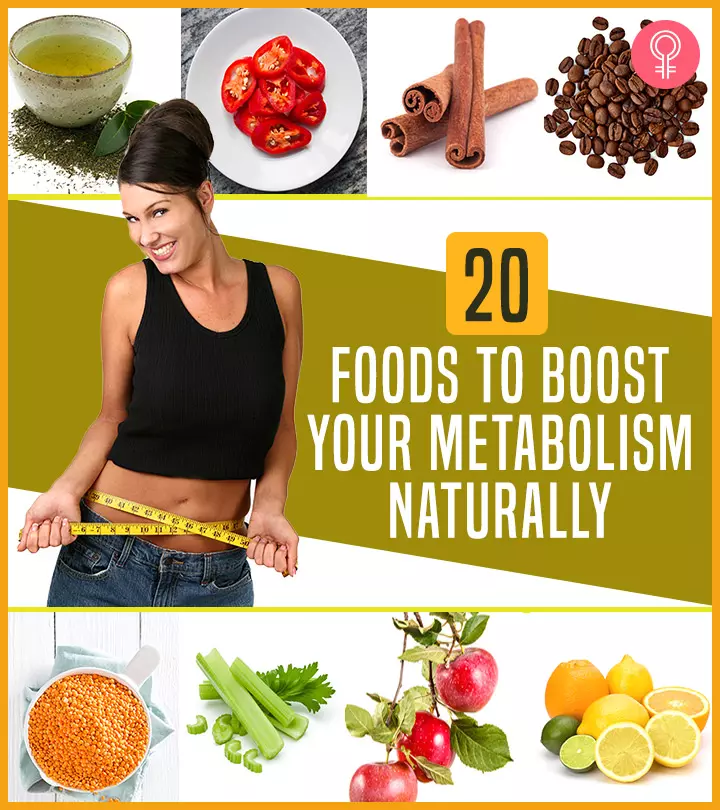



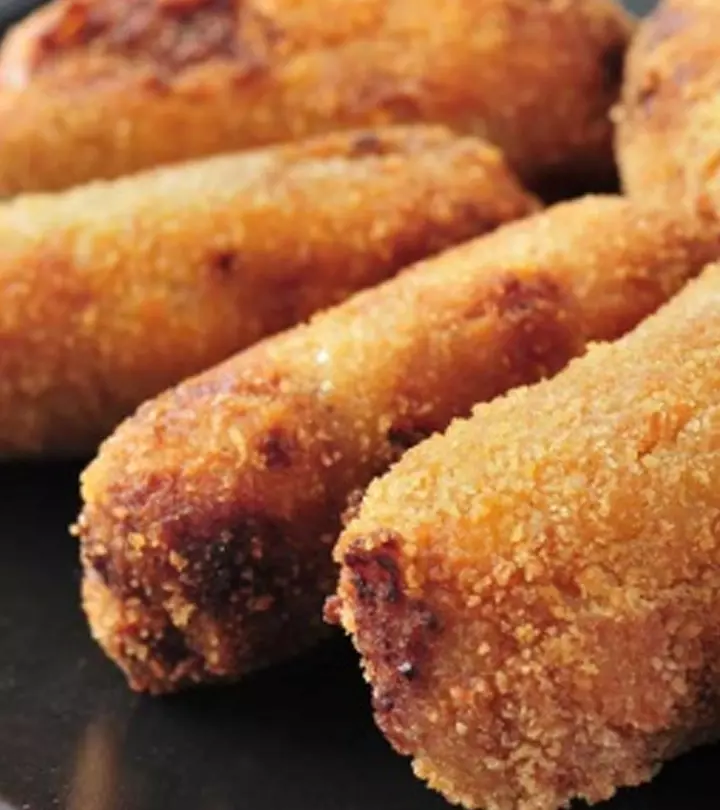
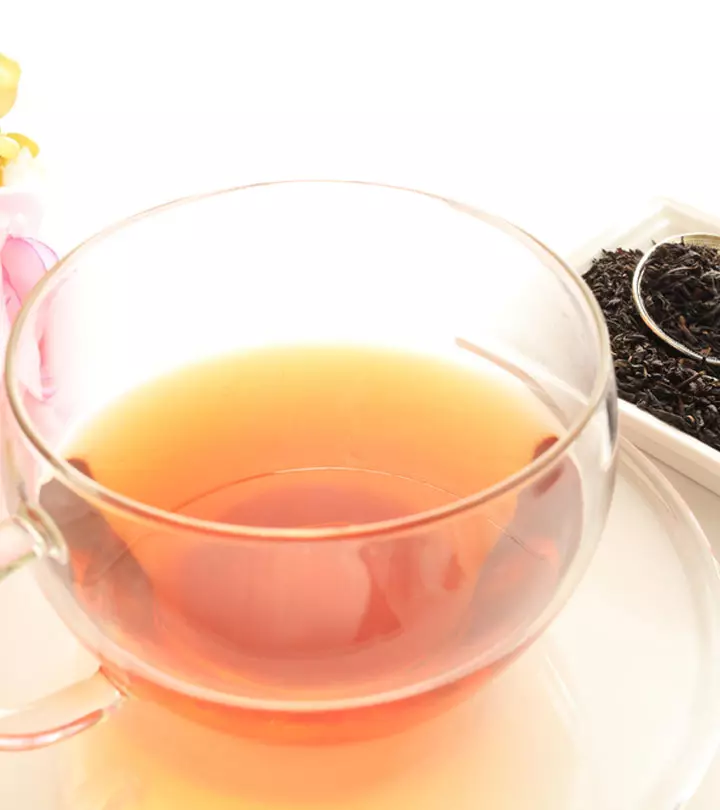

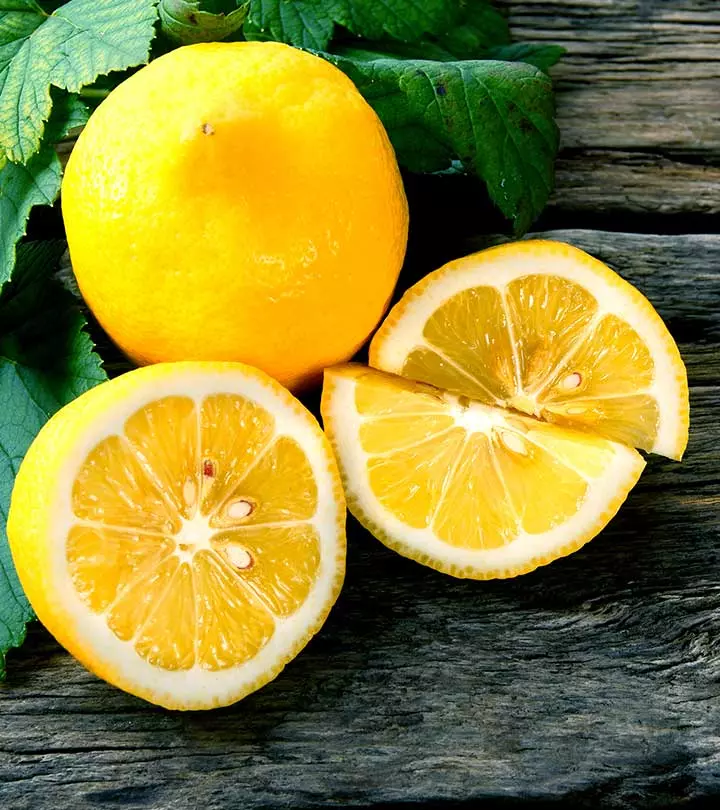

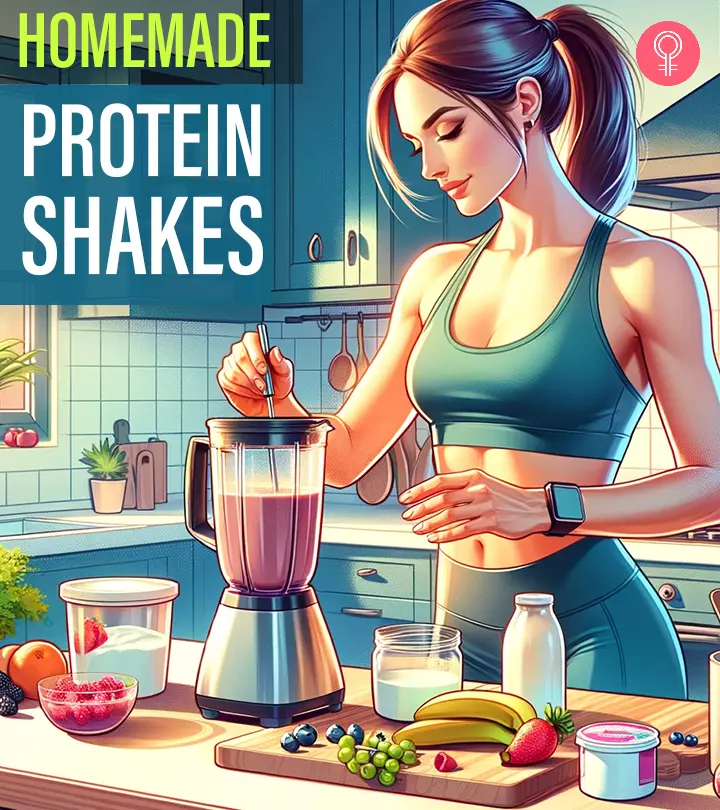
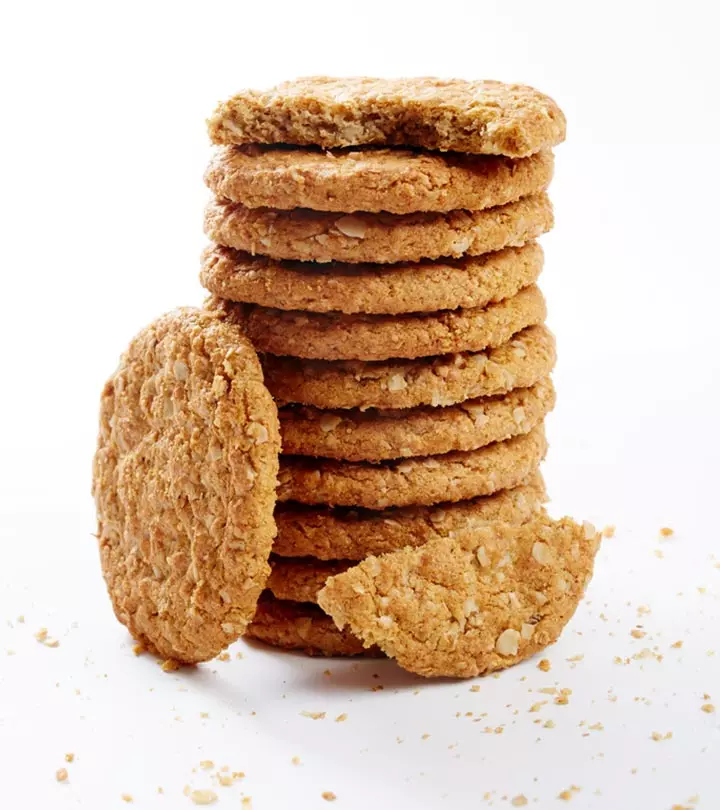

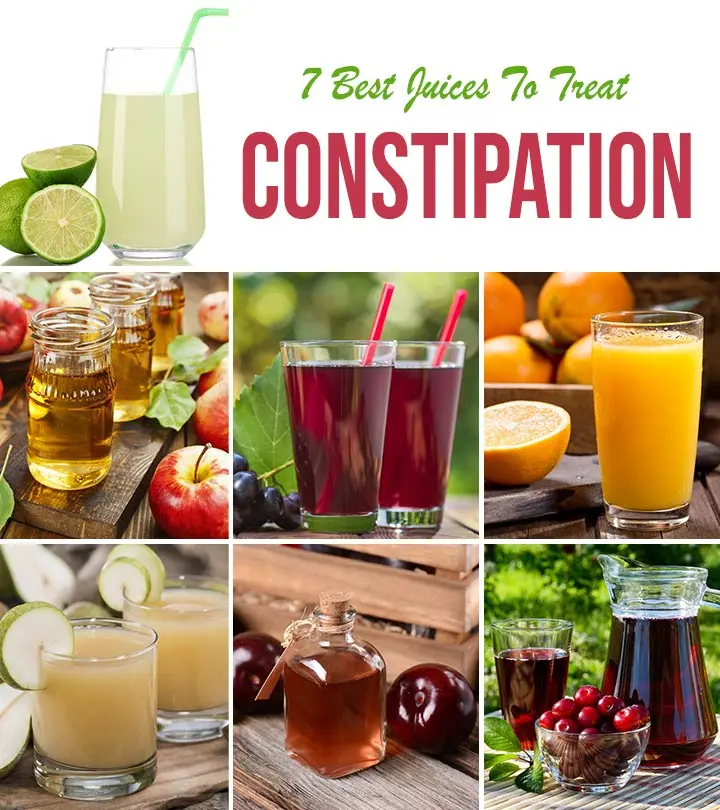


Community Experiences
Join the conversation and become a part of our empowering community! Share your stories, experiences, and insights to connect with other beauty, lifestyle, and health enthusiasts.